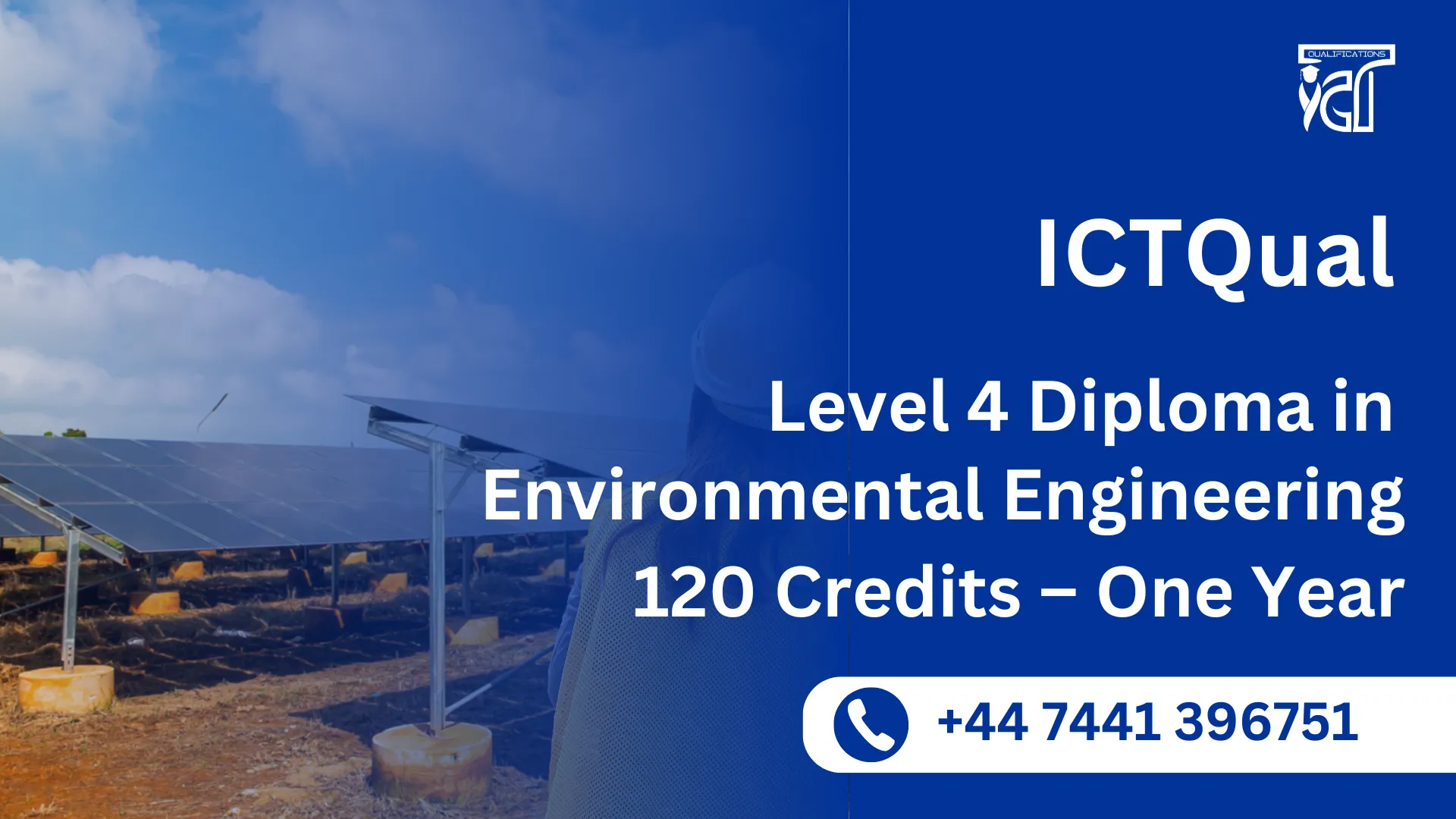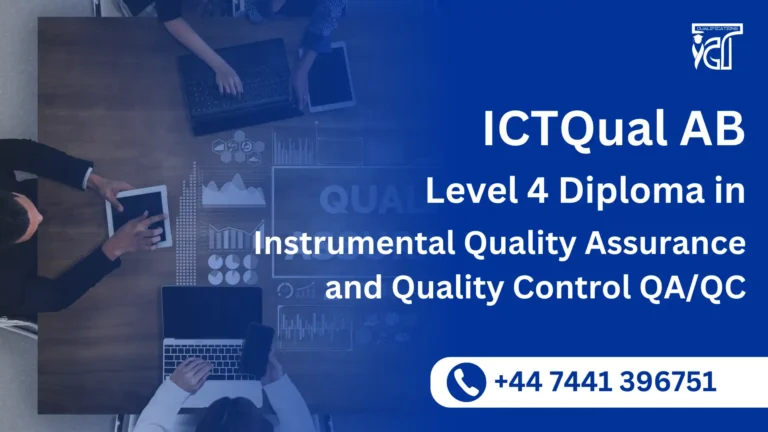In today’s world, environmental challenges are more pressing than ever, and the demand for qualified professionals in environmental engineering is growing rapidly. The ICTQual Level 4 Diploma in Environmental Engineering (120 Credits – One Year) offers an excellent opportunity for individuals looking to build a solid foundation in sustainable engineering and tackle some of the most significant environmental issues. This qualification is designed to equip students with the skills and knowledge necessary to pursue a successful career in environmental engineering and related fields.
The ICTQual Level 4 Diploma in Environmental Engineering is a one-year qualification worth 120 credits. It is specifically designed to provide a comprehensive understanding of environmental management, sustainable technologies, and pollution control strategies. This course is aimed at individuals who are eager to develop practical and theoretical knowledge in the environmental engineering field, with a focus on energy efficiency, water management, and waste reduction. The Ofqual-regulated qualification ensures that the course meets high academic standards, and its international recognition makes it a valuable asset for professionals looking to expand their expertise in environmental engineering.
By completing this diploma, students will gain the expertise required to contribute effectively to sustainable development goals, implement eco-friendly solutions, and design environmentally-conscious systems in various sectors such as construction, renewable energy, and infrastructure.
The ICTQual Level 4 Diploma in Environmental Engineering provides a well-rounded education in the key principles of environmental science and engineering. This qualification covers a variety of essential topics, from environmental legislation and renewable energy systems to waste management and pollution control technologies. With its one-year duration and 120 credits, the diploma offers a balanced curriculum that blends theoretical learning with practical application.
The course aims to prepare students for the challenges of the modern engineering world by focusing on the most critical environmental issues. Students will gain the tools necessary to design sustainable systems, improve resource management, and tackle climate change.
The ICTQual Level 4 Diploma in Environmental Engineering (120 Credits – One Year) is an essential qualification for anyone looking to pursue a career in environmental engineering or sustainability. It offers a well-rounded curriculum that combines practical experience with theoretical knowledge, preparing graduates to address the environmental challenges of today and tomorrow. Whether you’re starting your career or looking to specialize in renewable energy and pollution control, this diploma provides the foundation you need for success.
ICTQual Level 4 Diploma in Environmental Engineering 120 Credits – One Year
Following are the study units for ICTQual Level 4 Diploma in Environmental Engineering 120 Credits – One Year:
- Introduction to Environmental Engineering
- Environmental Impact Assessment
- Water and Wastewater Treatment
- Air Quality and Pollution Control
- Solid Waste Management and Recycling
- Renewable Energy Systems
- Sustainable Engineering Practices
- Environmental Regulations and Policies
- Climate Change and Environmental Risk Management
- Soil and Groundwater Contamination
- Environmental Project Management
- Advanced Topics in Environmental Engineering
GLH (Guided Learning Hours) and TQT (Total Qualification Time) are terms commonly used in vocational qualifications to help define the amount of time a learner is expected to spend on their studies.
1. GLH (Guided Learning Hours)
GLH refers to the number of hours a learner spends being directly taught, supervised, or supported during their course. This includes the time spent in activities such as:
- Classroom instruction
- Practical workshops
- One-on-one tutoring or mentoring sessions
- Online learning sessions with tutor support
In other words, GLH represents the time that learners are actively engaged with their instructors or learning activities.
2. TQT (Total Qualification Time)
TQT represents the total amount of time a learner is expected to invest in completing a qualification, including:
- GLH (Guided Learning Hours): Time spent on direct learning, as explained above.
- Self-Directed Learning: This includes time spent on independent study, research, assignment completion, preparation for exams, and any other work the learner does outside of direct teaching hours.
TQT is a broader measure that includes all the time required to achieve the qualification. It helps learners and employers understand the overall commitment required for the qualification.
Key Differences Between GLH and TQT:
- GLH focuses on direct learning with guidance or supervision.
- TQT includes GLH as well as independent study time and other learning-related activities.
Example:
If a qualification has a TQT of 600 hours and a GLH of 250 hours, it means the learner should spend 250 hours in direct learning (classroom, online, or tutor-led sessions) and 350 hours on independent study or research.
The ICTQual Level 4 Diploma in Environmental Engineering equips learners with the essential knowledge and practical skills necessary for addressing the critical environmental challenges of today. Upon successful completion of this qualification, learners will be able to demonstrate the following learning outcomes for each study unit:
1. Introduction to Environmental Engineering
- Understand the fundamental principles of environmental engineering and its role in addressing environmental challenges.
- Identify key environmental issues and their impact on ecosystems, human health, and society.
- Demonstrate knowledge of global environmental policies, laws, and regulations that guide environmental engineering practices.
- Explain the importance of sustainability and its integration into engineering design and solutions.
2. Environmental Impact Assessment
- Demonstrate an understanding of environmental impact assessments (EIA) and their importance in project planning.
- Identify and apply methods and tools used in conducting an EIA.
- Evaluate the potential environmental, social, and economic impacts of engineering projects.
- Interpret and comply with legal and ethical considerations involved in environmental assessments.
3. Water and Wastewater Treatment
- Understand the principles and processes involved in water and wastewater treatment.
- Design water treatment systems and identify appropriate treatment technologies.
- Assess the effectiveness and sustainability of wastewater treatment methods.
- Apply environmental regulations in the management of water quality and wastewater discharge.
4. Air Quality and Pollution Control
- Identify the types of air pollutants and their sources.
- Evaluate the impact of air pollution on human health and the environment.
- Understand and apply air pollution control technologies and strategies.
- Monitor and assess air quality and implement corrective measures where necessary.
5. Solid Waste Management and Recycling
- Analyze the principles of sustainable solid waste management and disposal methods.
- Evaluate and apply recycling and waste minimization strategies in various sectors.
- Design and manage waste management systems that comply with environmental regulations.
- Understand the environmental benefits of circular economy principles and their application in waste management.
6. Renewable Energy Systems
- Understand different types of renewable energy sources and their potential environmental impact.
- Evaluate the feasibility and design renewable energy systems for various applications.
- Analyze the integration of renewable energy systems into existing infrastructure.
- Identify the environmental benefits and challenges of renewable energy technologies.
7. Sustainable Engineering Practices
- Understand and apply the principles of sustainable engineering design.
- Evaluate the environmental impacts of engineering projects and apply sustainable practices to mitigate those impacts.
- Implement strategies for energy efficiency, resource conservation, and eco-friendly design.
- Utilize life cycle assessments to support sustainable decision-making in engineering projects.
8. Environmental Regulations and Policies
- Understand the role of environmental policies and regulations in guiding environmental engineering practices.
- Identify and analyze global, regional, and local environmental laws and standards.
- Evaluate the impact of compliance with environmental regulations on engineering projects.
- Apply environmental regulations in the design, implementation, and monitoring of engineering solutions.
9. Climate Change and Environmental Risk Management
- Understand the science of climate change and its environmental, social, and economic impacts.
- Evaluate strategies for mitigating climate change impacts within the engineering context.
- Apply environmental risk management techniques to assess and minimize the impact of climate change on infrastructure.
- Develop and implement adaptation strategies for climate change resilience in environmental engineering projects.
10. Soil and Groundwater Contamination
- Understand the causes, types, and effects of soil and groundwater contamination.
- Assess the risks associated with soil and water pollution and their impact on human health and the environment.
- Apply remediation techniques to manage and clean up contaminated sites.
- Evaluate the effectiveness of contamination control measures and monitor soil and groundwater quality.
11. Environmental Project Management
- Demonstrate knowledge of project management principles in the context of environmental engineering projects.
- Plan, execute, and evaluate environmental engineering projects in compliance with regulatory and sustainability requirements.
- Manage project risks, timelines, budgets, and stakeholders to ensure successful project outcomes.
- Communicate effectively with project teams, clients, and regulatory bodies.
12. Advanced Topics in Environmental Engineering
- Understand and apply emerging trends and advanced technologies in environmental engineering.
- Analyze case studies of complex environmental engineering challenges and solutions.
- Evaluate the integration of new technologies in addressing modern environmental issues, such as smart cities and sustainable infrastructure.
- Research and explore innovative solutions to tackle ongoing environmental challenges.
Benefits of the ICTQual Level 4 Diploma in Environmental Engineering 120 Credits – One Year:
1. Ofqual-Regulated and Globally Recognized
- The ICTQual Level 4 Diploma is Ofqual-regulated, meaning it meets the highest standards set by the Office of Qualifications and Examinations Regulation (Ofqual). This ensures that the qualification is recognized worldwide, making it an excellent choice for individuals aiming to enhance their careers on a global scale.
2. Comprehensive Skill Development
- This course offers a robust understanding of environmental engineering principles, focusing on key areas like pollution control, sustainable design, renewable energy systems, and waste management. Graduates gain essential skills to address contemporary environmental challenges, helping them become well-rounded professionals in the field.
3. Career Advancement Opportunities
- By completing this diploma, you open up various career paths in the environmental engineering sector. Whether you’re looking to work in sustainability consulting, energy management, renewable energy, or pollution control, the qualification equips you with the expertise to thrive in these rapidly growing industries.
4. Hands-On and Industry-Relevant Knowledge
- The course curriculum is designed to bridge the gap between theory and practice, ensuring that students are well-prepared to implement real-world solutions. You’ll gain insights into environmental legislation, impact assessments, and sustainable technologies, making you equipped to address environmental concerns in the workplace.
5. Specialization in Renewable Energy and Sustainability
- The diploma emphasizes critical aspects of renewable energy and sustainability, two of the most important fields in today’s environmental landscape. You will develop expertise in green energy systems and eco-friendly engineering practices, which are highly sought after in the workforce.
6. Enhanced Job Market Competitiveness
- As industries increasingly prioritize environmental sustainability and green technologies, professionals with expertise in these areas are in high demand. The diploma helps you gain a competitive edge in the job market, positioning you as a skilled candidate for roles such as environmental engineer, energy consultant, or sustainability manager.
7. Flexible and Manageable Duration
- With a duration of just one year, the ICTQual Level 4 Diploma offers an ideal learning pathway for both full-time students and working professionals. The flexible learning format makes it easier for you to balance education with your personal and professional commitments.
8. Pathway to Further Education
- The diploma serves as a stepping stone for further education. After completing this Level 4 qualification, you can progress to more advanced diplomas (Level 5 or Level 6) or pursue a Master’s degree in environmental engineering, sustainability, or renewable energy.
9. Practical Application of Environmental Solutions
- The course equips you with the tools to design and implement sustainable engineering solutions in real-world situations. By learning to apply principles of energy efficiency, waste reduction, and green technologies, you will be ready to address environmental issues effectively in various sectors.
10. Contribution to Global Sustainability Goals
- This qualification provides the knowledge necessary to help combat global challenges such as climate change, pollution, and resource depletion. By studying environmental engineering, you’ll be empowered to contribute to the development of sustainable solutions that can make a tangible difference in your community and the world.
In summary, the ICTQual Level 4 Diploma in Environmental Engineering (120 Credits – One Year) offers an excellent opportunity to develop key skills in environmental engineering and sustainability. Whether you’re looking to start your career or specialize in renewable energy and pollution control, this diploma provides the foundation for success in a rapidly evolving and highly impactful field.
The ICTQual Level 4 Diploma in Environmental Engineering (120 Credits – One Year) is an ideal fit for a diverse range of individuals, particularly those looking to build or enhance their careers in environmental engineering, sustainability, and renewable energy. Here’s a breakdown of the best-fit candidates for this course:
1. Aspiring Environmental Engineers
- If you’re looking to start your career in environmental engineering, this diploma provides you with the necessary foundational knowledge and skills. You’ll be well-prepared to embark on a career focused on sustainable design, pollution control, and energy management.
2. Professionals Seeking Specialization in Sustainability
- This course is an excellent choice for engineers or technicians who want to specialize in sustainability. If you have a background in civil, mechanical, or electrical engineering, the diploma helps you transition into environmental engineering by providing specialized expertise in green technologies and eco-friendly infrastructure.
3. Renewable Energy Enthusiasts
- If you’re passionate about renewable energy and want to develop a career in green energy systems (such as solar, wind, or biomass energy), this diploma offers a strong foundation. It equips you with the knowledge needed to implement energy-efficient solutions and tackle challenges related to climate change.
4. Sustainability Consultants and Environmental Managers
- This qualification is perfect for environmental consultants or sustainability managers who want to expand their expertise. It provides a deeper understanding of environmental legislation, impact assessments, and pollution control technologies, enabling you to provide more effective strategies for clients or organizations striving to improve their environmental footprint.
5. Graduates in Science or Engineering Disciplines
- If you are a graduate in fields like environmental science, civil engineering, or mechanical engineering, this diploma serves as a valuable next step in transitioning to environmental engineering or sustainability roles. It allows you to build on your existing knowledge and gain specialized skills in green technologies and renewable energy.
6. Mid-Career Professionals Looking to Transition into Environmental Roles
- For individuals already working in engineering or technology-related fields and looking to pivot to environmental engineering, this course offers a structured learning path to broaden your career horizons. The one-year duration makes it a flexible option for professionals who wish to gain new qualifications while continuing their careers.
7. Environmental Policy Makers or Government Workers
- Government officials, policy makers, or urban planners involved in sustainable development and environmental policy will benefit from this qualification. It helps you gain technical knowledge to create effective policies for managing energy resources, pollution, and sustainable urban planning.
8. Individuals Interested in Further Education in Environmental Engineering
- This diploma is also ideal for those looking to advance their education. After completing this Level 4 qualification, you can continue your studies with Level 5 or Level 6 diplomas, or even pursue a Master’s degree in related fields such as environmental management, renewable energy, or sustainable engineering.
In conclusion, the ICTQual Level 4 Diploma in Environmental Engineering is best suited for individuals committed to environmental sustainability, green technologies, and energy management. Whether you’re entering the field, transitioning from another engineering discipline, or advancing your career in renewable energy or environmental policy, this course provides the essential skills and knowledge to succeed in a rapidly growing industry.
Entry Requirements
Register Now
Qualification Process
Qualification Process for the ICTQual Level 4 Diploma in Environmental Engineering 120 Credits – One Year
- Self-Assessment:
Begin by evaluating your eligibility to ensure you meet the qualification requirements, including work experience, knowledge, and language proficiency. - Registration:
Complete your registration by submitting the required documents, including a scanned copy of a valid ID, and paying the registration fee. - Induction:
An assessor will conduct an induction to confirm your eligibility for the course and explain the evidence requirements. If you do not meet the criteria, your registration will be canceled, and the fee will be refunded. - Assignmnets & Evidence Submission:
Provide all assignmnets and the necessary evidence based on the assessment criteria outlined in the course. If you are unsure of the required evidence, consult with the assessor for guidance on the type and nature of evidence needed. - Feedback and Revision:
The assessor will review your submitted evidence and provide feedback. Evidence that meets the criteria will be marked as “Criteria Met,” while any gaps will be identified. You will be asked to revise and resubmit if needed. - Competence Evidence:
Submit final evidence demonstrating that all learning outcomes have been met. This evidence will be marked as “Criteria Met” by the assessor once it is satisfactory. - Internal Quality Assurance (IQA):
The Internal Quality Assurance Verifier (IQA) will review your evidence to ensure consistency, quality, and compliance with standards. - External Verification:
The IQA will submit your portfolio to ICTQUAL AB External Quality Assurance Verifiers (EQA) for final confirmation. The EQA may contact you directly to verify the authenticity of your evidence. - Certification:
Upon successful completion of all checks, ICTQUAL AB will issue your official certificate, confirming that you have attained the ICTQual Level 4 Diploma in Environmental Engineering 120 Credits – One Year.






